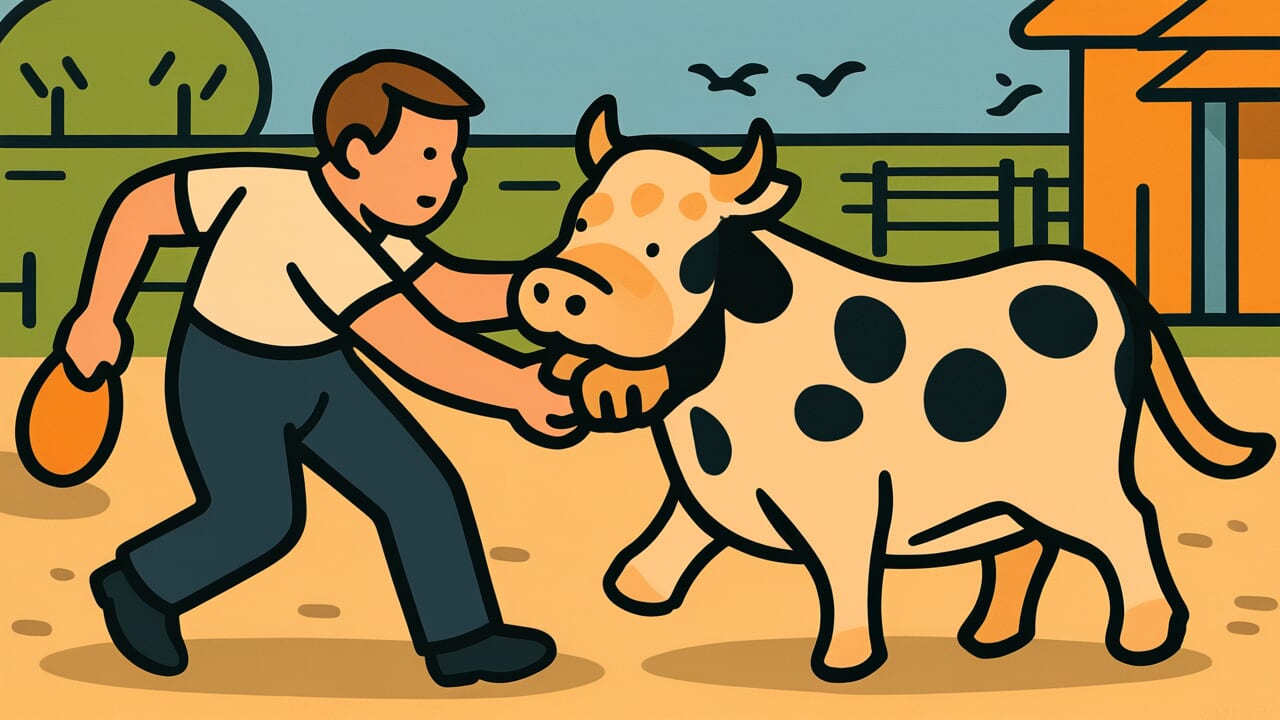How to Read “Win a cat and lose a cow”
Win a cat and lose a cow
[win uh kat and looz uh kow]
All words are straightforward and easy to pronounce.
Meaning of “Win a cat and lose a cow”
Simply put, this proverb means you gain something small but lose something much bigger and more valuable in the process.
The saying uses two animals to show the difference in value. A cat might be nice to have around, but a cow is worth much more. A cow gives milk, can help with farm work, and feeds a family. Trading away something precious for something less important shows poor judgment.
We use this idea when people make bad deals or focus on the wrong things. Someone might take a lower-paying job just because it sounds more exciting. They win the fun job but lose the steady income. Or a student might skip studying to play games, winning entertainment but losing good grades.
What makes this wisdom interesting is how often people do this without realizing it. We get distracted by small rewards and forget about bigger goals. The proverb reminds us to think about what we’re really giving up. Sometimes the cost is much higher than what we gain.
Origin and Etymology
The exact origin of this proverb is unknown, though it appears to come from rural farming communities where livestock had clear value. The saying reflects a time when people understood the worth of farm animals through daily experience. Cows represented significant wealth and security for families.
During agricultural periods, losing valuable livestock could mean disaster for a household. Cows provided milk, cheese, butter, and eventually meat. They also helped with heavy farm work. A cat, while useful for catching mice, could never replace a cow’s value. This comparison would have been obvious to anyone living in farming communities.
The proverb likely spread through oral tradition as people shared wisdom about making good decisions. Farming communities often used animal comparisons to teach lessons about value and judgment. Over time, the saying moved beyond rural areas as people recognized its broader meaning about poor choices and misplaced priorities.
Interesting Facts
The proverb uses a common teaching method called contrast, where two very different things show the size of a mistake. Many languages have similar sayings that compare small gains with large losses, though they use different animals or objects based on local culture.
The word “win” in this context means “gain” or “obtain,” which was a more common usage in older English. This meaning still appears in phrases like “win someone’s heart” or “win approval.”
Usage Examples
- Manager to employee: “You saved $50 on office supplies but lost our biggest client over late delivery – win a cat and lose a cow.”
- Friend to friend: “You got that discount coupon but missed the job interview appointment – win a cat and lose a cow.”
Universal Wisdom
This proverb reveals a fundamental flaw in how humans evaluate choices. Our brains often focus on immediate, visible rewards while overlooking larger, long-term consequences. This happens because small gains feel real and certain, while bigger losses might seem distant or abstract.
The pattern exists because of how our minds process information. We naturally pay more attention to things right in front of us. A small benefit today feels more important than a large cost tomorrow. This served our ancestors well when survival meant grabbing available food or shelter. But in complex situations, this instinct leads us astray.
The deeper truth touches on human nature’s relationship with value and time. We struggle to weigh different types of worth against each other. Something entertaining feels valuable in the moment, even when it costs us something more important later. The proverb captures this eternal human challenge of seeing the full picture when making decisions. It reminds us that our first instinct about value might be wrong, and that stepping back to consider the complete trade-off usually reveals better choices.
When AI Hears This
People don’t just grab small rewards by accident. They build stories that make losing feel like winning. When someone settles for less, they create reasons why it’s actually better. This mental trick protects them from disappointment. They convince themselves the smaller prize was the smart choice all along.
This pattern reveals something deeper about human survival instincts. Uncertainty feels dangerous, even when bigger rewards wait. The brain treats emotional safety like physical safety. People would rather feel secure with little than anxious with potential for more. This explains why humans often choose guaranteed small wins over risky big ones.
What’s remarkable is how this “flaw” might actually be wisdom. In a world full of real dangers, caution kept humans alive. The ability to find satisfaction in smaller victories prevents despair. It’s not just about bad math or poor choices. It’s about emotional survival in an uncertain world.
Lessons for Today
Living with this wisdom means developing the habit of asking what you’re really giving up before making decisions. The challenge lies in recognizing these situations as they happen, not just afterward when the loss becomes obvious. Most people can see bad trades clearly when others make them, but miss their own.
The key insight involves learning to pause and compare the full value of what you’re trading. This means looking beyond immediate appeal to long-term worth. When someone offers you something attractive, consider what you’ll lose to get it. Time, money, relationships, and opportunities all have value that might not be obvious at first glance.
This wisdom works best when you remember that not every trade is worth making, even when the immediate gain looks appealing. Sometimes the smartest choice is keeping what you have rather than chasing something new. The proverb doesn’t say never make trades, but rather to make sure you understand what you’re really exchanging. With practice, you can learn to spot situations where you might win a cat but lose a cow, and choose differently.



Comments